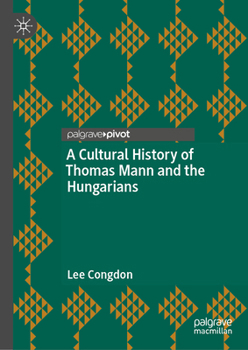A Cultural History of Thomas Mann and the Hungarians
This book is a study in cultural collegiality and interchange. Over the course of a long life, Thomas Mann established working relationships with some of Hungary's cultural luminaries. On the six occasions that he visited Budapest to give public readings of his work, he met the novelists Dezső Kosztol nyi and S ndor M rai. Because they wrote in Hungarian, those distinguished writers were not then widely known outside of Hungary; since then, however, many of their novels have appeared in English and other languages, to critical acclaim. Both Kosztol nyi and M rai spoke German fluently and were thus able to engage Mann in serious discussions of the literary art. The Manns were received with pleasure at the Buda villa of J zsef Luk cs, a prominent banker whose son Gy rgy (Georg) was living abroad because of the role he played in the Hungarian Soviet Republic of 1919. The young Luk cs wrote primarily, though not exclusively, in German and Mann read and admired his early - and subsequently his later - work. The ensuing literary, epistolary, and personal contacts between the great German writer and the famous Marxist critic and philosopher led Mann to the work of B la Bal zs, the writer and film theorist, and Arnold Hauser, the sociologist of art and literature. It was primarily as a correspondent and a creative writer in need of expert advice that Mann formed a friendship with the learned student of mythology and religion K roly (Karl) Ker nyi. From these Hungarians and others, including Arthur Koestler, Aurel Kolnai, Charles de Tolnay, and B la Bart k, Mann was pleased to acknowledge that he gained insights that contributed immeasurably to his work and self-understanding. At the same time, the Hungarians drew inspiration from their association with one of the greatest writers of the twentieth century. Together with him, they wrote a little-known but fascinating chapter in the cultural history of modern Europe.





